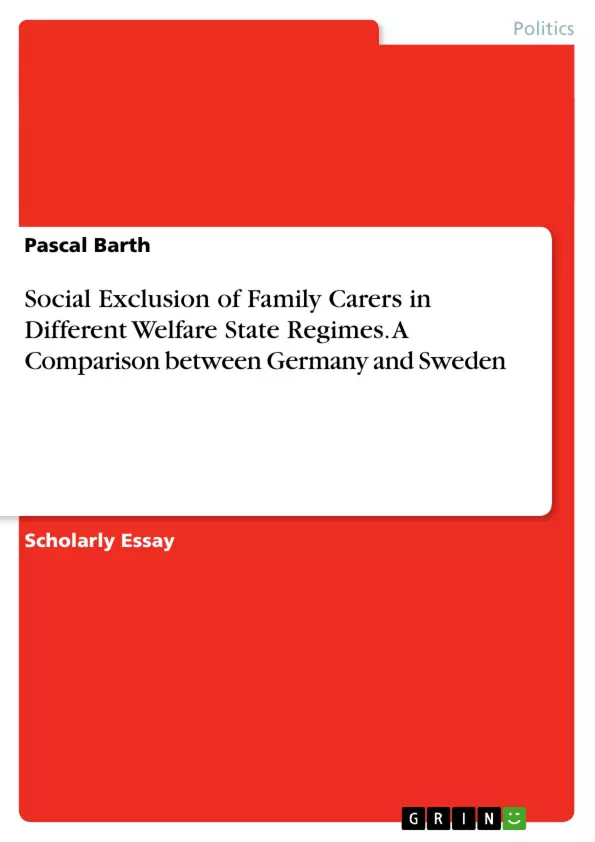The general framework of informal care differs significantly between Germany and Sweden. The
present paper analyses these differences and their impact on family carers situation based on the
multidimensional concept of social exclusion.
Elder care in Germany is provided within the framework of a Bismarkian, conservative corporatist
welfare state. The design of the German supplemental care benefits results in familialism, particularly
for carers of lower socio economic classes. Its strong male bread winner model and strong traditional
gender role expectations constitute a high risk of marginalisation for women.
The swedish welfare system is considered to be social democratic. De-familializing strategies,
comparatively weak traditional gender role expectations, a weak male breadwinner model and
comprehensive public care provision minimizes the risk of marginalisation for carers.
The results of recent European surveys support the hypothesis of a lower risk of marginalisation for
carers in Sweden: Swedish carers face a far lower risk of exclusion from the labour market, a lower
risk of financial marginalisation, are less likely affected by health impairments and face a lower risk of
social isolation compared to German carers.
Inhaltsverzeichnis (Table of Contents)
- Abstract
- Introduction
- Social exclusion and family carers
- Welfare state architectures, gender ideologies and their impact on family carers
- Design of the Swedish welfare benefits
- Design and effect of German care benefits
- Characteristics of family carers and care situations in Germany and Sweden
- Findings of marginalisation of family carers in Germany and Sweden
- Dimension of labour market participation
- Financial dimension
- Dimension of carers health
- Dimension of social relationships
- Dimension of spatial availability of services and institutional coverage of demand
- Institutional exclusion
- Conclusion
- Bibliography
Zielsetzung und Themenschwerpunkte (Objectives and Key Themes)
This paper explores the impact of welfare state regimes on the social exclusion of family carers, focusing on Germany and Sweden. It examines the differences in informal care provision, considering structural conditions and specific elements of the respective welfare architectures, ultimately analyzing how these differences affect the marginalization of family carers.
- Social exclusion of family carers in different welfare states
- Comparison of Germany and Sweden as contrasting welfare models
- Impact of welfare state design and gender ideologies on family carer marginalization
- Analysis of social exclusion dimensions including labor market participation, financial security, health, social relationships, spatial access, and institutional exclusion
- Quantitative and qualitative data analysis of recent European surveys to support the findings
Zusammenfassung der Kapitel (Chapter Summaries)
The paper begins by defining social exclusion and its relevance to the situation of family carers. It highlights the growing need for care due to demographic changes and the evolving societal landscape. The paper then explores the contrasting welfare state architectures of Germany and Sweden, contrasting their approaches to care provision and their potential impact on family carers' social inclusion. The paper analyzes the specific design of care benefits in both countries, highlighting the potential for social exclusion based on factors like gender roles and economic status. Finally, the paper presents findings from recent European surveys that provide quantitative and qualitative data to support the theoretical arguments about the social exclusion of family carers in Germany and Sweden.
Schlüsselwörter (Keywords)
This research focuses on the social exclusion of family carers, particularly in Germany and Sweden, highlighting the differences in welfare state architectures and their impact on marginalization. Key concepts include informal care, welfare state regimes, gender ideologies, social exclusion, labor market participation, financial security, health, social relationships, and spatial access. The research uses quantitative and qualitative data from recent European surveys to analyze the situation of family carers in both countries.
- Arbeit zitieren
- Pascal Barth (Autor:in), 2010, Social Exclusion of Family Carers in Different Welfare State Regimes. A Comparison between Germany and Sweden, München, GRIN Verlag, https://www.hausarbeiten.de/document/188870


